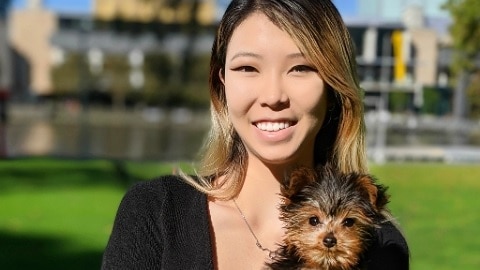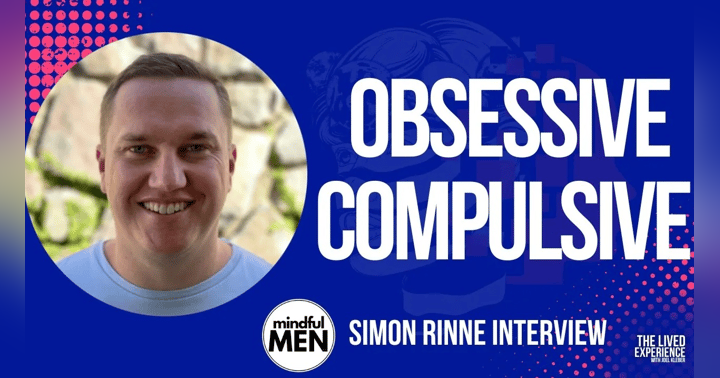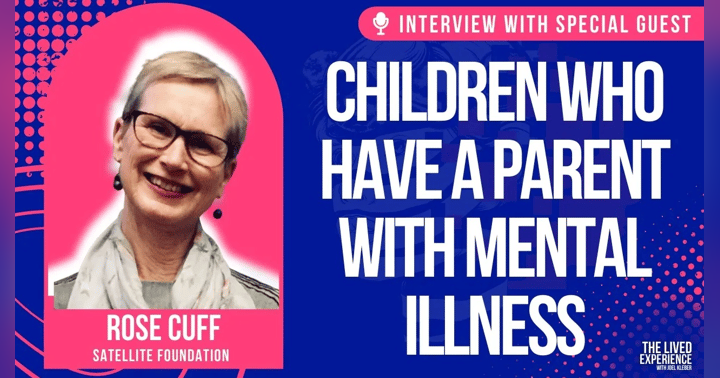Interview with Emily Unity on The Lived Experience Podcast with Joel Kleber

Interview with Emily Unity
Emily Unity is a Mental Health professional, Software Engineer, and Creative Designer, with over 14 years’ experience co-designing solutions to systemic barriers.
They ground their work in their lived and living experiences as an LGBTQIA+, disabled, and neurodiverse young person from a refugee and migrant background.
Emily is passionate about designing innovative solutions and is founder of multicultural mental health platform Multicultural Minds and author, illustrator, and publisher of Ozigami.
Emily endeavours to help create a world for all people, regardless of their backgrounds, identities, or intersectionality.
JOEL: Why are you passionate about mental health?
EMILY: I was first diagnosed with mental health challenges when I was about 12 or 13. But I don’t think that was the first time that I experienced them. I grew up in a like quite culturally diverse background.
My mom’s a Vietnam War Refugee and my dad's a Malaysian immigrant. And they both didn't really have the words for depression, or anxiety or mental health, in that language.
I grew up without any sort of mental health literacy and help seeking was really discouraged, particularly within like a wide society.
And it's really been through difficult experiences of first going through those types of things that I've managed to just get into the system and had these less-than-ideal experiences.
Through those hard journeys I've learned to meet people that understand me for who I am and shared lived experiences that I found as being the most powerful thing for my hope and recovery—like medication and traditional therapies have helped to an extent.
But the main thing for me is that peer support that shared that experience and that's what brought me to this type of work.
I've been volunteering in mental health since I was first diagnosed—so, from around age 13.
And now I work as a mental health professional and kind of designing services around like, how do we better engage with people with lived and lived experience and mental health challenges from a variety of backgrounds, and kind of use our experiences to inform those service designs to make sure that things don't happen the way that they've happened to us.
And we're really making sure that there's nothing about us without us.
How'd you work that out when you first had challenges?
The earliest memory that I have in terms of something that I would describe as like symptomatic was around age six, where we were in class in school.
I was growing up in a very domestically violent household, I had different experiences with eating disorders, and struggle with my gender and sexuality. And it's only when I was 12, or 13, where I had this very big breakdown at school—it was very public, that was after a hard night at home.
And I had struggled with physical health as well.
Everything came to that mass, or end where I dropped the mask. And if it weren't for that, I would have just kept pretending.
I just felt like everyone else around me, could just do everything and I couldn't, that everyone was expecting me to get on with it and be this, “perfect human” or their idea of perfect—it was just very tiring.
It only got to that crisis point where I was referred to the school psychologist and then referred to an external psychologist, and then a psychiatrist and put within different private and public systems. And going through that general, more traditional journey of diagnosis.
If it weren't for that crisis end, I don't think I would have ever gotten the help that I needed.
I'm very thankful that people were able to pick that up at the time and refer me to the right people.
That’s why I'm so passionate about youth mental health is because so many of us go through these types of experiences, and we all are just pretending that everything's okay.
And it's only until someone really notices and really questions it with a compassion and creates that safe space that we can open about and catch it early before it gets to that pointy end.
How does cultural differences affect your mental health?
I grew up in Australia, where my parents had already immigrated as teenagers. And so, I grew up speaking English as a first language, but being around like predominantly white people and going to a very privileged school, I didn't really see any people that really look like me.
I felt quite disconnected from everything—I was too Asian to fit in, but too white to fit into my parents’ cultures as well.
There's a lot of intergenerational traumas that happened from there and a lot of pain that they weren't supported with as well.
Like my mom escaped the Vietnam War when she was 13. And she didn't understand what trauma was until I started going through therapy for my PTSD—that is a wild concept to me.
And that generational distilling of understanding of mental health just really passed on to me. And it was something that I really wanted to work on to make sure that I didn't pass it on to anyone else as well.
How do you manage your PTSD?
I've been through very traditional type therapies, there's a lot of talk therapy they've come with PTSD type training. I tried a new tribal trauma therapy. And I have to say, I wasn't quite sold on it conceptually, even after so much time in therapy.
But there's this thing called EMDR—they wave this light or a finger in front of you and it tricks your brain into thinking this is a safe place you can relive the memories without having them roll your life going forward.
I think that's something that was powerful, and I started learning different strategies, whether they be creative or grounding.
Most of my trauma has come from places that I feel entirely out of control. I feel like frozen in place, I feel like I can't do anything about it.
But I know now, if I get triggered, that's not the circumstance anymore.
I have these strategies; I feel a lot more empowered to control my own narrative. I don't feel weak anymore.
It's such a fantastic feeling to celebrate the recovery that you've gone through and that each trigger that you go through, you can manage it a little bit better every time.
What reform do you see happening regarding young carers or children with family with a serious mental illness?
What's amazing now is that we're able to tackle it as it's happening. We don't have to design in hindsight, we're proactively designing and we're changing the system from being a crisis focus, and crisis driven sector, to something that's continuously getting better at helping people that are experiencing the issues right now.
We're not basing our knowledge on literature that was conducted in a study 20 years ago, it's people on the ground, living their experiences right now and creating programs themselves that help people just like them.
There's this fantastic initiative that I am very privileged to be a part of where we partner with a group of young carers and help them express their journeys and this creative piece with an artist.
And so, the artists listen to their stories, and over a series of workshops produce these artworks where it shows what it's like to be a young carer and their experiences, and then a little bit of tied to individual parts of their stories.
Through those creative expressions that really raise awareness of what people like and those scenarios—because not many people know what a young carer unless you're really in this space.
Through that creative expression or awareness raising, it's that co-design that can spread more and more awareness and bring us all into this conversation. Because as far as I am concerned, if we define lived experiences—either personal experiences mental health challenges, recovery, or supporting someone with their experiences—I don't know anyone that isn't a facet of lives and living experience.
I think we're all affected by mental health. And we all decide to be involved in the conversation about how we improve it.
Did you ever view yourself as a young kid?
Within the culture that I was raised in, being the oldest sibling was just expected of me to do.
Being the older sister, that was meant to be something that was expected of me. I didn't think that I was a carer—that I was doing something that was outside of my role.
I thought other kids had to do the same things as me. It was only until I really got involved in this space.
And I learned about that term that I investigated a little bit more and said, “Oh, wow, that that sort of happened to me too”.
That's a passion area of mine because there's a lot of gaps in our knowledge when you think about people that care for people with mental health difficulties you often think of either clinician are biological parents, but you miss so many other people in that equation—you miss the supporters, and the carers are not traditional.
And it's systemic, in terms of how you can heal a mental health journey you have to create, you must bring everyone along with you and you must involve everyone with that.
Interrogating, who are the people around you, who's looking around you is something that I wish happened to me.
But it's nice now that at least within the Royal Children's Hospital, we're involving a lot of young carers and the design, and its young carers, not just siblings, but people that also care for the other family members or friends as well. And which are changing the definition about what it means to be someone that looks after someone else without having to be a parent.
What do you seem that needs to happen next regarding mental health awareness?
There's still a lack of real representation of our stories and reels spaces where we can learn how to express our stories.
I only really learn this literacy and how to speak about my experiences through speaking workshops, very dedicated, specific training. And I think if that was more available to the public, then we could just talk generally about how we're experiencing life in a safe way.
The main kind of barrier right now is that we know that most of the people that we know, are probably experiencing mental health difficulties.
But how do we communicate about that? we don't have the support to go further than the just “are you okay?” “Are you really, okay”.
How do we navigate that system together?
How do we seek support together?
How do we have each other's backs through a day-to-day basis?
The step after awareness that is difficult is the action taking, and it's the interrogation with curiosity and compassion that not many people have the skill of resources to do.
So, I hope that through people that go through these types of trainings and get more familiar with the language, such as lived in living experience, that we can start these little ripple effects and go out and communities and start raising more awareness that way, but through upskilling people and empowering them that their voice is important.
It's not just awareness, they're part of this and this movement, something that can be really healing for them too.
How did you managed to have time to do what you've done?
I feel like creativity is just something that I had to do—it's like breathing. I don't think I know how to express myself. I think a lot of the things that I've like.
I feel like high achieving is something that I still struggle with—because I have impostor syndrome in that regard. But the things that I've managed to achieve because I've been really supported to get to those different points and identifying what I'm passionate about.
I think the main motivator for me most recently is knowing that I can help other people and making tangible change out of that. I was “high achieving” in school, but I didn’t kick as many goals as I feel like I am right now.
I think the reason is that now I am doing it for a purpose. I'm doing it for younger me and for people that are currently that I'm helping right now. I think that's the transact tangible change that I'm making. It gives me a sense of purpose and makes me want to keep doing more.
There's so much healing that I don’t claim that I'm not selfless completely. I'm not completely altruistic.
I've gotten so much healing and journey from this as well. The conversations I have, every day where I'm in that “help opposition”, I'm getting that help from the other person as well—It's mutual.
And I think that's what's beautiful is about like—conversations like you and I are having today. I've learned from you; I've appreciated the space that you've held for me.
There's no difference for me between work and personal life. I can't believe that I'm doing the work that I am now—it can really be cold work.
It just feels natural, it feels like it's something that I didn't know existed, lived in living experiences. I can't imagine myself doing anything else.
To learn more about Emily visit https://www.emilyunity.com/











